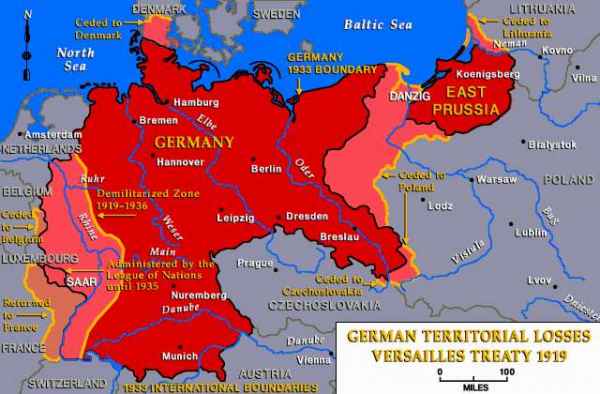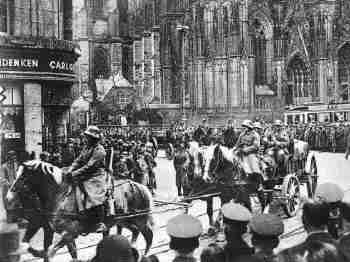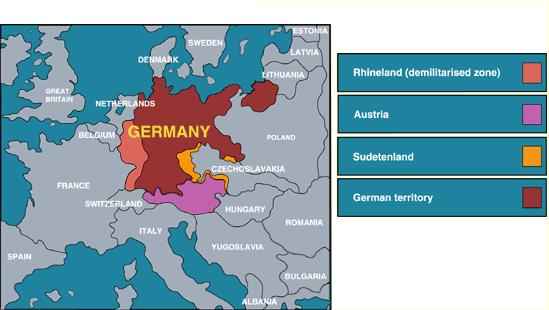Goering: The Rhineland Occupation

Dr. Stahmer: How did the occupation of the Rhineland come about?
Goering: The occupation of the Rhineland was not, as has been asserted here, a long-prepared affair. What had been discussed previously did not deal with the occupation of the Rhineland, but with the question of mobilization measures in the Rhineland in case of an attack on Germany. The Rhineland occupation came about for two reasons. The balance, which was created through the Locarno Pact, had been disturbed in Western Europe, because a new factor had arisen in France's system of allies, namely Russia, who even at that time had an extraordinarily large armed force.
In addition, there was the Russian-Czechoslovakian mutual assistance pact. Thus, the conditions upon which the Locarno Pact had been based no longer existed, according to our way of thinking. So, there was now such a threat to Germany, or the possibility of such a threat, that it would have been a neglect of duty and honor on the part of the Government if it had not done everything to ensure, here also, the security of the Reich. The Government therefore--as a sovereign state--made use of its sovereign right and freed itself from the dishonorable obligation not to place a part of the Reich under its protection, and it did place this important part of the Reich under its protection by building strong fortifications.
The construction of such strong fortifications, such expensive fortifications and such extensive fortifications, is justified only if that frontier is regarded as final and definitive. If I had intended to extend the frontier in the near future, it would never have been possible to go through with an undertaking so expensive and such a burden to the whole nation as was the construction of the West Wall.
This was done--and I want to emphasize this particularly--from the very beginning only in the interest of defense and as a defensive measure. It made the western border of the Reich secure against that threat which, because of the recent shift of power, and the new combination of powers such as the Franco-Russian mutual assistance pact, had become a threat to Germany. The actual occupation, the decision to occupy the Rhineland, was made at very short notice. The troops that marched into the Rhineland were of such small numbers--and that is an historical fact--that they provided merely a token occupation.
The Luftwaffe itself could not, for the time being, enter the Rhine territory on the left at all, since there was no adequate ground organization. It entered the so-called demilitarized territory on the right of the Rhine, Duesseldorf and other cities. In other words, it was not as if the Rhineland were suddenly occupied with a great wave of troops; but, as I said before, it was merely that a few battalions and a few batteries marched in as a symbol that the Rhineland was now again under the full sovereignty of the sovereign German Reich and would in the future be protected accordingly.

Mr. Justice Jackson: I remind you of the testimony of the witness Milch, sworn on your behalf, as to a subject on which I have not heard you express yourself. He said: "I had the impression that already at the time of the occupation of the Rhineland, he, Goering, was worried lest Hitler's policy should lead to war." Do you remember that?
Goering: Yes.
Mr. Justice Jackson: And was it true or false? True or mistaken, perhaps, I should say.
Goering: No, I did not want a war and I thought the best way to avoid a war was to be strongly armed according to the well-mown adage, "He who has a strong sword has peace."
Mr. Justice Jackson: Well, you are still of that opinion?
Goering: I am of that opinion today, now that I see the entanglements more than ever.
Mr. Justice Jackson: And it is true, as Milch said, that you were worried that Hitler's policies would lead to war at the time of the occupation of the Rhineland?
Goering: Excuse me, I just understood you to ask whether it is also my opinion today that only a nation that is strongly armed can maintain peace. That is what I meant to answer with my last statement. If you are connecting this question to the statement of Milch, that I was worried lest the policy of the Fuehrer might lead to war, I should like to say that I was worried lest war might come; and if possible I wanted to avoid it, but not in the sense that the policy of the Fuehrer would lead to it, because the Fuehrer also desired to carry out his program by agreements and diplomatic action. In regard to the occupation of the Rhineland I was somewhat worried at the time about the reactions; all the same, it was necessary.
Mr. Justice Jackson: And when nothing happened, the next step was Austria?
Goering: The one has nothing to do with the other. I never had any misgivings about Austria leading to a war, as I had with the Rhineland occupation, for in the case of the Rhineland occupation I could well imagine that there might be repercussions. But how there could be any repercussions from abroad over the union of two brother nations of purely German blood was not clear to me, especially since Italy, who always pretended that she had a vital interest in a separate Austria, had somewhat changed her ideas. It could not have mattered in the least to England and France, nor could they have had the slightest interest in this union. Therefore I did not see the danger of its leading to a war."

Mr. Justice Jackson: You testified that the movement into the Rhineland had not been planned in advance.
Goering: Only a short time in advance, I emphasized.
Mr. Justice Jackson: How long?
Goering: As far as I recall, at the most 2 to 3 weeks.
Mr. Justice Jackson: Now, I call your attention to the minutes of the 10th meeting of the Working Committee of the Reich Defense Council, Document Number EC-405 toward the end of that document, the discussion on 6th month, 26th day of 1935, which reads as follows ...
Goering: May I ask what page? This document is very long and is new to me. What page, please, otherwise I shall have to read the whole document.
Mr. Justice Jackson: Turn to the last paragraph and we will work backwards. "Commitment to writing of directives for mobilization purposes is permissible only insofar as it is absolutely necessary for the smooth execution of the measures provided for the demilitarized zone. Without exception such material must be kept in safes." Do you find that part?
Goering: This document that has been handed to me contains alternating statements of various individuals, that is, a dialogue. May I ask once more . . . . The last paragraph contains nothing of what you have stated, apparently there must be a difference between the German and English texts. The last paragraph here is altogether irrelevant. Where, please, am I to read in the document?
Mr. Justice Jackson: Do you find the third paragraph from the end? If my document is correct we have got the same document.
Mr. Justice Jackson: Do you find this: "The demilitarized zone requires special treatment. In his speech of 21 May 1935 and in other statements, the Fuehrer and Reich Chancellor declared that the stipulations of the Versailles Treaty and the Locarno Pact regarding the demilitarized zone would be observed." Do you find this?
Goering: Yes.

Goering: Yes.
Mr. Justice Jackson: And you also find, "These preparations include in particular"--a) and b) are not important to my present question--"c) Preparation for the liberation of the Rhine."
Goering: Oh, no, here you have made a great mistake. The original phrase--and this alone is the point in question--is: "c) Preparation for the clearing of the Rhine." It is a purely technical preparation that has nothing at all to do with the liberation of the Rhineland. Here it says, first, mobilization measures for transportation and communications, then "c) Preparation for the clearing of the Rhine," that is, in case of mobilization preparations the Rhine is not to be overburdened with freighters, tugboats, et cetera, but the river has to be clear for military measures. Then it continues: "d) Preparation for local defense," et cetera. Thus you see, it figures among small quite general, ordinary and usual preparations for mobilization. The phrase used by the Prosecution ...
Mr. Justice Jackson: Mobilization, exactly.
Goering: That, if you remember, I stressed clearly in my statement, that in the demilitarized zone general preparations for mobilization were made. I mentioned the purchase of horses, et cetera. I wanted only to point out the mistake regarding "clearing of the Rhine," which has nothing to do with the Rhineland, but only with the river.
Mr. Justice Jackson: Well, those preparations were preparations for armed occupation of the Rhineland, were they not?
Goering: No, that is altogether wrong. If Germany had become involved in a war, no matter from which side, let us assume from the East, then mobilization measures would have had to be carried out for security reasons throughout the Reich, in this event even in the demilitarized Rhineland; but not for the purpose of occupation, of liberating the Rhineland.
Mr. Justice Jackson: You mean the preparations were not military preparations?
Goering: Those were general preparations for mobilization, such as every country makes, and not for the purpose of the occupation of the Rhineland.
Mr. Justice Jackson: But were of a character that had to be kept entirely secret from foreign powers?
Goering: I do not think I can recall reading beforehand the publication of the mobilization preparations of the United States.
[Note: The above response by Goering sends Jackson into the first of a number of what can only be described as tantrums before the court, brought about by frustration with his own inability to effectively cross-examine the cunning defendant. Click here to access the full transcript of this days proceeding.]






The Nuremberg Tribunal Biographies
Caution: As always, these excerpts from trial testimony should not necessarily be mistaken for fact. It should be kept in mind that they are the sometimes-desperate statements of hard-pressed defendants seeking to avoid culpability and shift responsibility from charges that, should they be found guilty, can possibly be punishable by death.
Disclaimer:The Propagander!™ includes diverse and controversial materials--such as excerpts from the writings of racists and anti-Semites--so that its readers can learn the nature and extent of hate and anti-Semitic discourse. It is our sincere belief that only the informed citizen can prevail over the ignorance of Racialist "thought." Far from approving these writings, The Propagander!™ condemns racism in all of its forms and manifestations.
Source Note: The trial portion of this material, which is available in its entirety at the outstanding Avalon and Nizkor sites, is being presented here in a catagorized form for ease of study and is not meant to supplant or replace these highly recommended sources.
Fair Use Notice: This site may contain copyrighted material the use of which has not always been specifically authorized by the copyright owner. We are making such material available in our efforts to advance understanding of historical, political, human rights, economic, democracy, scientific, environmental, and social justice issues, etc. We believe this constitutes a "fair use" of any such copyrighted material as provided for in section 107 of the US Copyright Law. In accordance with Title 17 U.S.C. Section 107, the material on this site is distributed without profit to those who have expressed a prior interest in receiving the included information for research and educational purposes. If you wish to use copyrighted material from this site for purposes of your own that go beyond 'fair use', you must obtain permission from the copyright owner.

